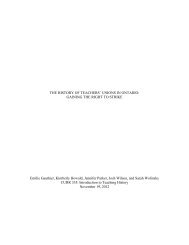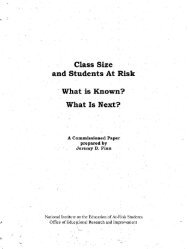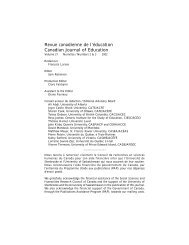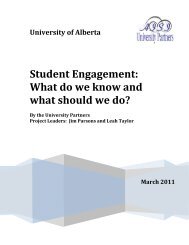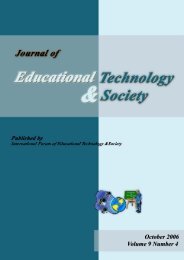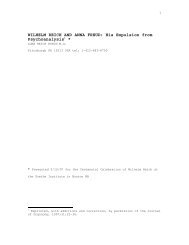NEOLIBERALISM Global neoliberalism and education and its consequences
NEOLIBERALISM Global neoliberalism and education and its consequences
NEOLIBERALISM Global neoliberalism and education and its consequences
Create successful ePaper yourself
Turn your PDF publications into a flip-book with our unique Google optimized e-Paper software.
44 Henry A. Girouxof students as customers <strong>and</strong> faculty as source of cheap labor is exactlywhat informs the current corporate underst<strong>and</strong>ing of the future of higher<strong>education</strong>. This model represents the face of higher <strong>education</strong> in the ageof global capital <strong>and</strong> market fundamentalism <strong>and</strong> is less about <strong>education</strong>than about training, less about educating students to be informed <strong>and</strong>responsible citizens of the world than about short-term returns on revenue,all the time providing a pseudo-academic warrant to reduce <strong>education</strong> toan extension of the corporate world. Clearly, this is a view that needs to beresisted if higher <strong>education</strong> is to retain any democratic value at all.At the same time, while compassion <strong>and</strong> concern for students <strong>and</strong>teachers wane, universities are eagerly entering into unholy alliances withbig corporations. No longer content to make their presence felt on collegecampuses through the funding of endowed chairs, academic centers,or research about business issues that eventually are used as case studies,companies such as BMW <strong>and</strong> IBM are taking their involvement withhigher <strong>education</strong> to a new level of involvement. When the German automakerBMW contributed $10 million to Clemson University in 2002 tohelp develop a $1.5 billion automotive <strong>and</strong> research center, Clemson gaveBMW an extraordinary amount of control over curriculum <strong>and</strong> hiringprocedures. Not only did BMW play a role in developing the curriculumfor the automotive graduate engineering school, but it also “drew up profilesof <strong>its</strong> ideal students; [provided] a list of professors <strong>and</strong> specialiststo interview, <strong>and</strong> even had approval rights over the school’s architecturallook” (Browning, 2006, p. C1). In addition, BMW gave Clemson’s presidenta BMW X5 to drive. In spite of Clemson’s claims that it retains <strong>its</strong>independence as a public university despite <strong>its</strong> close ties with BMW, c<strong>and</strong>idatesfor the endowed chairs were interviewed by BMW executives <strong>and</strong>“a network council composed of BMW managers meets monthly to adviseClemson on the curriculum” (p. C6). Thomas Kurfess, the first personhired to fill a BMW endowed professorship, has no reservations about thegrowing corporatization of higher <strong>education</strong>, noting that “This is a differentmodel. It is nice to be able to show that it’s not just the name beyondthe chair . . . [<strong>and</strong> have] real ties to industry” (Jaschik, 2006a). A lawsuitcontesting the contract between BMW <strong>and</strong> Clemson made public a letterwritten by a BMW official who stated that “BMW is going to drive theentire campus” (Browning, 2006, p. C6). At least BMW is honest about <strong>its</strong>intentions <strong>and</strong> the role it wants to play in shaping Clemson’s relationshipwith industry.While the cult of professionalism inspires fear <strong>and</strong> insecurity in academicsterrified about maintaining tenure, getting it, or for that mattersimply securing a part-time position, university educators also face theharsh lessons of financial deprivation, overburdened workloads, <strong>and</strong> theloss of power in shaping the governance process. They devote less timeto their roles either as well-informed public intellectuals or as “cosmopolitanintellectuals situated in the public sphere” (Aronowitz, 1998,



